In a recently held Annual General Meeting, the Karachi Tax Bar Association (KTBA) announced the results of its elections, with Syed Rehan Hasan Jafri being re-elected as the President for the year 2022.
(more…)Category: Trade & Industry
This section covers news on trade and industry. Pakistan Revenue is committed to providing the latest updates on business trends.
-
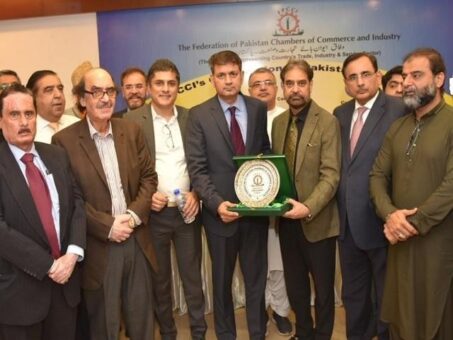
Tax slabs reduction may be considered: FBR chairman
KARACHI: Dr. Muhammad Ashfaq Ahmed, chairman, Federal Board of Revenue (FBR) on Tuesday said reduction in income tax slabs may be considered.
Addressing the business community at Federation of Pakistan Chambers of Commerce and Industry (FPCCI) said that existing income tax slabs were implemented after due consideration.
Earlier, the business community pointed out high number of tax slabs in the Income Tax Ordinance, 2001.
READ MORE: Withholding tax should be on income: FBR Chairman
Commenting on requirement of Computerized National Identity Card (CNIC) on transactions, he said this condition was introduced three years ago. The FBR has gathered bulk of information due to this condition. Further, many cases of using fake CNICs for making transactions were also reported, he added.
The FBR chairman said that retailers had positively responded to integration of Point of Sales (POS) in Karachi. “Many issues will be resolved with improvement in supply chain,” he added.
The business community raised the issues of audit notices. Dr. Ashfaq said that action would be taken if audit notices were not responded. “The audit notices should be responded with documentary evidence,” he said.
READ MORE: UAE favorite hiding for Pakistan assets: Dr. Ashfaq
About the tax laws, he said that foreign companies investment in Pakistan are unaware about our domestic laws, he said and assured that the FBR would facilitate both local and foreign investors to understand tax laws.
Earlier, Anjum Nisar, Chairman, Businessmen Panel (BMP) said that delay in tax refunds create liquidity issues for industries. He said if taxpayers delays in compliance then he is subject to penalty and surcharges. Similarly, this should be apply to tax officials, he added.
Irfan Iqbal Sheikh, President FPCCI, put forward the concerns and complaints of the business, industry and trade community of Pakistan to the Federal Board of Revenue during the detailed visit of its Chairman, Dr. Ashfaq Ahmed; along with the top brass of FBR.
READ MORE: FBR explains cash discount under sales tax laws
FPCCI President said that excessive and unsubstantiated tax notices; maladministration and corrupt elements; requirement of buyers’ CNIC copy; huge backlog of refund cases; double taxation; misuse of erstwhile FATA & PATA exemptions; higher rates of corporate, sales and withholding taxes; mandatory POS integration with FBR; multiplicity of income tax slabs and SRO culture are the major impediments in reforming the taxation system and broadening of the tax base.
Irfan Iqbal Sheikh added that 29 percent corporate tax and 17 percent sales tax are too high for economic growth, industrialization and employment generation; and, rates of these taxes should be gradually and progressively brought down. He elaborated that no country of the world has ever progressed in the absence of industrialization; while commending the recently announced industrial growth package of the federal government.
READ MORE: FBR amends fresh property valuations for Islamabad
Engr. M.A. Jabbar, VP FPCCI, emphasized that we have to do away with the notice manufacturing practices of the taxation machinery as that prohibits the new taxpayers to register themselves into the system to avoid unnecessary regulatory interferences.
Dr. Ashfaq Ahmed, Chairman FBR, expressed his willingness to have policy deliberations over FPCCI’s demand of reducing audit period to three years from the current six years. He also apprised the session that FBR has performed exceedingly well despite the debilitating economic conditions arising out of COVID-19 pandemic and have collected record taxes. He also expressed his optimism that FBR can soon achieve a Tax-to-GDP ratio of 12 per cent.
-
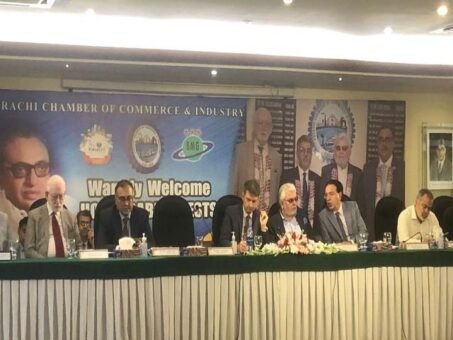
Withholding tax should be on income: FBR Chairman
Karachi, March 14, 2022 – The Chairman of the Federal Board of Revenue (FBR), Dr. Muhammad Ashfaq Ahmed, emphasized the need for a shift in the approach to withholding tax (WHT), suggesting that it should be levied on income rather than transactions. He made these remarks during an address at the Karachi Chamber of Commerce and Industry (KCCI) on Monday.
(more…) -

Karachi Chamber fears deep impact of PKR devaluation
KARACHI: Karachi Chamber of Commerce and Industry (KCCI) has expressed deep economic impact of massive devaluation of Pakistan Rupee (PKR) against the dollar.
(more…) -

Political turmoil to create economic instability: FPCCI
KARACHI: Perturbed with ongoing political uncertainties following the no-confidence motion moved, the business community urged the treasury and opposition to resolve the issues through talks as unrest creating unstable economic conditions.
Anjum Nisar, chairman, Businessmen Panel (BMP) and former president of Federation of Pakistan Chambers of Commerce and Industry(FPCCI) feared that political climate of the country has become unpredictable due to political uncertainty, reducing the level of investment and affecting the economic growth of the country, suggesting the government as well as the opposition parties to settle issues through talks in parliament, which the right way to resolve the issues.
READ MORE: FPCCI demands allowing clearance of solar equipment
He appealed the political leadership to act wisely and show commitment with the country, as the lack of political stability is ruining the trade and economic activities in the country.
The FPCCI former president said that this situation might create unstable economic conditions, generating higher risks, and transforms into low investment while inflation is one of the key sources of uncertainty. The high rate of inflation leaves the nation uncertain about potential investments, he added.
READ MORE: FPCCI proposes charter to protect economy from politics
He said that the financial sector is stable, as the government has continuously been bringing reforms in different sectors. He said that the government has been working on sustainable growth which will boost up to 6% further. He said several reforms had been made in industrialization, housing and agricultural sector.
He said that the country is facing a huge economic loss only because of wrong statements and irrational attitude of political players. He said that a week of stalled economic activity costs the country around $ 500 million and $2 billion per month and poor economy like Pakistan cannot afford even one million dollar loss to exports. He said that at a time when country is facing severe internal and external challenges, the situation is bound to affect the national interests.
READ MORE: Banks not issuing forms for land trade with Turkey: FPCCI
He said that in the past, politics of agitation has caused irreversible loss to the national economy besides tarnishing the soft image of the country. He said that in present scenario, country cannot afford to bear more economical loss. He said that business community is the main stakeholder of the economy and it should not be treated as useless thing.
He said the economy of Pakistan was on the path of sustainable growth due to successful economic policies of the government.
He appreciated the government to make all out efforts for reducing the negative effects of inflation by creating conducive atmosphere for investors, jobs for youth and targeted subsidies.
READ MORE: FPCCI suggests regulating cryptocurrencies in Pakistan
He attributed the higher economic growth to rising exports, increasing remittances and improving tax collection that had gone up by 32 percent. However, he also said the economy had to face certain difficulties due to higher commodity prices in the international market. The utilization of electricity had gone up by 13 per cent whereas the corporate profits were also at historic high, he said. The Pakistan economy has continued to recover despite the challenges of the Covid-19 pandemic, but imbalances have widened and risks remain elevated. Timely and consistent implementation of policies and reforms remain essential to lay the ground for stronger and more sustainable growth, he said.
Pakistan can double its traditional exports in next five years and lift exports by providing incentives to the sector and building a strong ecosystem for startups in the country, he said.
He said the government is also focusing on improving productivity by reviving industries and improving the agriculture sector.
He said that China has planned to shift up to 85 million jobs to foreign countries in next 10 years and Pakistan government can request the Chinese leadership to move at least 10 million jobs to Pakistan by relocating its key industrial units to special economic zones in the country, he suggested. He said that China can increase imports from Pakistan that would also improve productivity and generate more opportunities for jobs in the country.
-
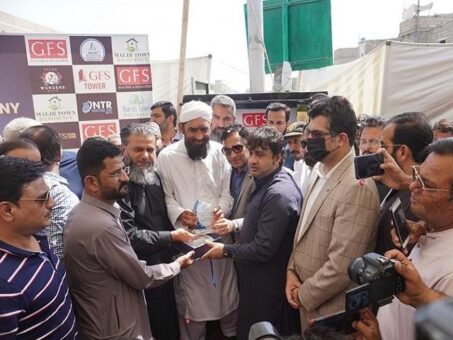
NKATI launches industrial area beautification
KARACHI: North Karachi Association of Trade & Industry (NKATI) has launched drive to beautify industrial area with the collaboration of GFS Builders & Developers and DMC.
Initially, jointly laid the foundation stone for the renovation of Park and Saba Chowrangi in Sector 16B, a statement said on Sunday.
READ MORE: NKATI urges PM Imran to reduce petroleum prices
Maulana Bashir Farooqi, Chairman, Sailani Welfare Trust, Irfan Wahid, CEO, GFS Builders & Developers, Faisal Moiz Khan, President, NKATI, Taha Saleem, Deputy Commissioner & Administrator, Central District, Shabir Ismail, SVP NKATI, VP Naeem Haider, Sadiq Mohammad, S. Tariq Rasheed, Akhtar Ismail, Shaukat Ismail, Naseem Akhtar, Nasir Darwish, Shahid Ansari, Younus Khamisani, Iftikhar Malik, Mahmood Rangoonwala, Farooq Khatura, Faisal Shabo, Syed Nasir Ali, Yasir Ali, Shehzad Elahi, Kashif Ghauri, Sajjad Aziz, Mudassar Saeed and a large number of industrialists were present.
READ MORE: Pakistan raises petrol price to record high at Rs160/liter
Maulana Bashir Farooqi, Chairman, Sailani Welfare Trust laid the foundation stone of the project, and offered special prayers. He said that the beginning of beautification of North Karachi Industrial Area is welcome and the efforts of GFS Builders, NKATI, DMC are commendable.
Bashir Farooqi appreciated the role of the industrialist community in stabilizing the economy and providing employment, and said that the business community should come forward, and set up more and more industries so that no one would be left unemployed.
READ MORE: NKATI expresses concerns over gas disconnection
Faisal Moiz Khan, President, North Karachi Association of Trade & Industry (NKATI), said that Karachi’s infrastructure is in bad condition and we will continue to play a vital role in improving Karachi’s infrastructure and enhancing the beauty of the city of lights.
Faisal lauded the cooperation of GFS Builders & Developers and DMC and said that the renovation of intersections in North Karachi Industrial Area as well as construction of a park in Sector 16-B would provide opportunities for healthy recreation.
READ MORE: NKATI condemns artificial raw material shortage
Irfan Wahid, CEO, GFS Builders & Developers, said that GFS will play its role in beautifying Karachi and will continue its cooperation in the style of renovation works in North Karachi Industrial Area with the help of NKATI.
Taha Saleem, Deputy Commissioner, Central District, welcomed the joint venture of NKATI, GFS, and assured his cooperation, saying that such joint efforts would bring cleanliness and beauty to the Industrial Area.
-
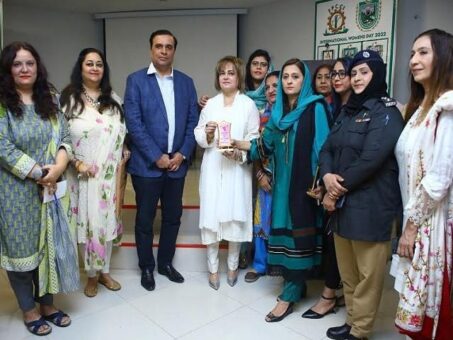
Women entrepreneurs vow to continue struggle for rights
Women entrepreneurs have vowed to continue the struggle for women’s rights, stressing that it is important to provide awareness to women in order to achieve their rights, while also empowering women in various sectors of the economy.
Women entrepreneurs should have maximum opportunities to move forward.
Speaking at an event held at the Federation of Pakistan Chambers of Commerce & Industry (FPCCI) to mark International Women’s Day, Member National Assembly Nusrat Wahid said that PTI government is working hard for women’s rights and Prime Minister Imran Khan’s vision is that women should be given equal opportunities in every field.
Vice Chairman of FPCCI Managing Committee Muhammad Suleman Chawla, Member Managing Committee Shabbir Mansha Churra, Former VP FPCCI and Founder President Karachi Women Chamber of Commerce & Industry District Malir (KWCCI), Nazli Abid Nisar, Zoreed Raza, Hina Tariq, SHO Women and Children Police Station South Zone, Afzala Shaheen, SVP KWCCI, VP Yasmin Arif, Prof. Shaista Afghani, Collector Customs Nauman Batool, Advocate Lubna, Sana Nadeem, Mahesh Ayana, Shamim Dar, Iqra Saqib, Mehreen Elahi, Dr. Ghazala Yasmeen, Shahida Amjad, Afshin Tariq, Shami Khan, Kausar Salmani, Shazia Khan, Mina Batool and a large number of women entrepreneurs participated.
MNA Nusrat Wahid further said that the laws that are being formulated today were announced 14 centuries ago and a study of Surah An-Nisa would give a detailed understanding of the rights of women and even the right of women regarding inheritance.
Earlier Founder President Karachi Women Chamber of Commerce & Industry District Malir, Nazli Abid Nisar, while welcoming the guests, stated that FPCCI is an important platform for highlighting women’s issues and struggle for their rights, and we are also grateful to Hina Mansab Khan, due to which we got the biggest platform of the country.
Nazli Abid requested the government through FPCCI to help women entrepreneurs and facilitate them in doing business. Our only agenda is to increase the participation of women in Pakistan’s economy.
She noted that we have many work plans and roadmaps to achieve this goal. We know this is a long journey. However, women entrepreneurs need encouragement and support to continue this journey.
-

Businessmen hope $5bn investment under PM package
KARACHI: Businessmen have estimated around $5 billion new investment alone in industrial sector under a package recently announced by Prime Minister Imran Khan.
The Chairman of FPCCI’s ruling group of BMP Mian Anjum Nisar observed that the new ordinance has amended the Income Tax Ordinance 2001 to extend the promotion package for industry and encourage entrepreneurs to invest in industrial undertakings out of their undisclosed assets.
READ MORE: FPCCI demands allowing clearance of solar equipment
“We salute the PM Imran Khan and appreciate the efforts of his whole team, especially Finance Minister Shaukat Tarin, Federal Industries Minister Khusro Bakhtiar, PM Advisor Razaq Dawood, Secretary Industries Jawwad Rafique and Joint Secretary Hamid Atique for launching the game-changing and SME-inclusive industrial growth package, which was promulgated through presidential ordinance,” he added.
FPCCI newly-elected president and managing committee chairman Irfan Iqbal Sheikh added that tax incentives, especially for those with documented funds, are important to attract investors. But these alone will not do the trick.
READ MORE: FPCCI proposes charter to protect economy from politics
The government should also undertake legal, regulatory and energy reforms, and cut the bureaucratic red tape to make manufacturers and exporters competitive in international markets, he suggested, adding that Pakistan has grown its overseas sales in the last couple of years but its dependence on low-value-added textiles and lack of market diversification means that its imports have far outpaced its exports.
Mian Anjum, who is also FPCCI former president, observed that the entire business, industrial and trade community of Pakistan join hands to acknowledge and appreciate the Prime Minister Imran Khan on the announcement of truly historical, inclusive, facilitative and redefining industrial growth package, with a special silver lining for the micro, small and medium enterprises (MSMEs)-the real engine of growth and employment generation in any economy.
READ MORE: Banks not issuing forms for land trade with Turkey: FPCCI
He maintained that the package of tax incentives would push industrialization in the country and strengthen efforts to support private capital investment in the manufacturing businesses.
The real appreciating point of the package is that the business community was taken onboard in the whole process and FPCCI’s all suggestions were incorporated in the industrial package, he said.
The LCCI President and PIAF Chairman Mian Nauman Kabir said that narrow and inadequate industrialization is one of the major reasons for Pakistan’s low exports and, consequently, the repeated currency crises that the economy has endured over the last several decades after brief periods of economic boom. He said that no country could advance economically, generate jobs and alleviate poverty without boosting and diversifying industrial productivity. Little wonder Pakistan has sought 12 bailout packages from the IMF in the last three decades to cope with its recurring balance-of-payment difficulties. The journey to diversified industrialization can be tough and long, and requires consistency in policies and perseverance, he said.
READ MORE: FPCCI suggests regulating cryptocurrencies in Pakistan
PIAF senior vice chairman Nasir Hameed said that the package is aimed at bolstering investments in new companies, revive closed factories and help existing industrial units expand their production capacities and upgrade their technology. The incentives will be applicable on capital investments of Rs 50 million and above in small to large industrial units.
PIAF vice chairman and Footwear Manufacturers Association former chief Javed Siddiqi said that all local, foreign and overseas Pakistani investors are eligible to benefit from the tax cuts and exemptions if they start production before the end of FY24 what is more important is that no questions will be asked about the source of funds invested in industrial projects, which was the major demand of the industry that was also accepted, leading to attract new investment of up to $5 billion in the country. Resident and non-resident Pakistanis willing to bring back their foreign disclosed and undisclosed assets to the country will get some additional tax benefits, he added. He said that the new amnesty scheme would boost exports and create new jobs, as tax relief would lead to substantial fresh local and foreign capital investment in the months ahead.
The country is facing many financial challenges including the current account deficit, balance of payments gap, swelling imports and foreign loans, however, with concerted efforts and right policies, the country will pass through the tough period, he said.
He said that enhancing manufacturing base was vital to achieve sustainable goals, as the government has introduced long-term policies primarily aimed at sustainable economic growth in the country and to achieve the economic targets.
Highlighting several other incentives announced by the government, he said they would usher the nation towards an industrial revolution, besides increasing export volume. He said that tax collection reached the record level of Rs6 trillion from Rs3.5 trillion, as the government was taking steps to reduce the tax burden on the public and widening the tax net.
-

Tax amnesty launched for setting up new industrial units
ISLAMABAD: The federal government on Thursday launched a tax amnesty scheme for setting up new industrial units. The amnesty scheme has been introduced through a presidential ordinance.
Under the amnesty scheme, the Federal Board of Revenue (FBR) will not ask the source of funds to be utilized for setting up the new industrial undertaking. However, five per cent tax shall be levied for whitening the money.
READ MORE: FBR issues new list of active taxpayers
According to the Income Tax (Amendment) Ordinance, 2022, any eligible person may file a statement by September 30, 2022, declaring the amount of funds (which have not been declared in any of the returns of income up to tax year 2021 filed by December 31, 2021) for investment in a new company formed for establishing and operating an industrial undertaking in accordance with this section.
The funds shall be deposited in rupees in a dedicated bank account in Pakistan as equity of the newly formed company, incorporated under the Companies Act, 2017 (XIX of 2017), before the filing of the statement and such funds shall only be used for purchase or import of plant and machinery through letter of credit or for construction of building and structure for the industrial undertaking.
READ MORE; FBR launches new Active Taxpayers List; return filing grows by 58%
The minimum amount which would qualify for the purposes of this section shall be fifty million rupees.
The provisions of section 111 of the Income Tax Ordinance, 2001 (related to undisclosed income) shall not apply to the funds declared subject to fulfilment of conditions as laid down in this section and payment of an amount equal to five percent thereof along with the statement filed.
The new industrial undertaking in which such investment is made shall commence commercial production by the June 30, 2024 and a certificate to that effect, duly issued by Engineering Development Board, is submitted to the Commissioner along with the return filed for tax year 2024.
READ MORE: POS invoice verification for prize scheme surges by 63%
Any amount of tax paid under this section shall not be refundable or adjustable against any other tax liability of the declarant.
Where a declarant has paid tax under this section in respect of funds declared under sub-section (1), the declarant shall be entitled to incorporate the same in his wealth statement, financial statements or books of accounts, as the case may be.
READ MORE: Sales tax exempted on all petroleum products
For the purposes of this section, eligible person means all persons, except-
(a) holders of public office, their spouses and dependent children;
(b) a public company as defined in clause (47) of section 2 of this Ordinance;
(c) a person who has filed a declaration under the Voluntary Declaration of Domestic Assets Act, 2018, the Foreign Assets (Declaration and Repatriation) Act, 2018, or the Assets Declaration Act, 2019;
(d) a person that has been declared a bank loan defaulter by a bank or a financial institution within the last three years; or
READ MORE: FBR registration made mandatory for housing projects
(e) a director of a company who has been declared a bank loan defaulter by a bank or a financial institution within the last three years.
(7) The provisions of this section shall not apply to —
(a) any proceeds of crime, corruption, money laundering and terror financing;
(b) any amount which is subject of any departmental or court proceedings;
(c) the investments made in following sectors, namely:–
(i) arms and ammunitions;
(ii) explosives;
(iii) sugar;
(iv) cigarettes;
(v) aerated beverages;
(vi) flour mills;
(vii) vegetable ghee; and
(viii) cooking oil manufacturing excluding extraction units.
-
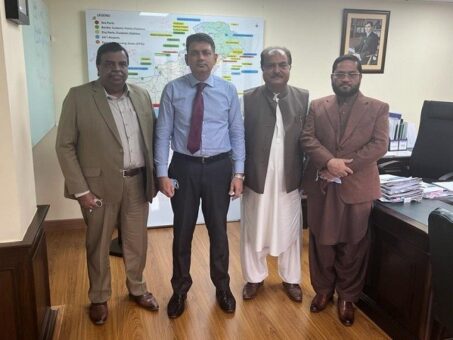
FBR assures Customs agents of resolving issues
Dr. Muhammad Ashfaq Ahmed, Chairman of the Federal Board of Revenue (FBR), assured a delegation of customs agents of resolving pertinent issues related to imports and exports.
(more…)
